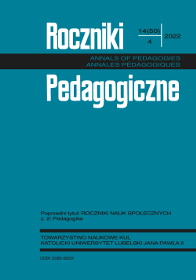Between Engagement and Parental Burnout: The Importance of Community
Main Article Content
Abstract
Parental engagement is an activity which brings many benefits to children and parents as well. Fatigue is a side effect of the involvement, in an extreme case it leads to exhaustion and parental burn out. The results of the research show that it is related to the individualism present in social life and the upbringing. The analysis of this phenomenon shows that both individualistic and collectivist approaches to education do not provide full development opportunities and do not prevent from the burnout. Therefore, it is necessary to re-evaluate the meaning of the community, both in the living and task-related dimension of its functioning. Building a family community and participating in social communities creates optimal conditions for the development of family members.
Article Details
References
Bakiera, L. (2013). Zaangażowane rodzicielstwo a autokreacyjny aspekt rozwoju dorosłych. Warszawa: Wydawnictwo Difin.
Bakiera, L. (2014). Zaangażowanie w rodzicielstwo na tle współczesnej rodziny. Kultura i Edukacja, 2(102), 146-172.
Bakiera, L., Stelter, Ż. (2010). Rodzicielstwo z perspektywy rodziców dziecka pełnosprawnego i niepełnosprawnego intelektualnie. Roczniki Socjologii Rodziny. Studia Socjologiczne i Interdyscyplinarne, 20, 131-151.
Banach, I. (2019). Świadomi rodzice i ich poczucie koherencji w wychowaniu w świetle koncepcji Anthonovsky’ego. Wychowanie w Rodzinie, 21(2), 189-212.
Błasiak, A. (2019). Między (nie)obecnością a zaangażowaniem. Rodzicielstwo rekonstruowane w ponowoczesności. Kraków: Wydawnictwo Naukowe Akademii Ignatianum.
Bokszański, Z. (2007). Indywidualizm a zmiana społeczna. Polacy wobec nowoczesności. Raport z badań. Warszawa: Wydawnictwo Naukowe PWN.
Bybluk, M. (2003). Kolektywizm. W: T. Pilch (red.), Encyklopedia Pedagogiczna XXI wieku. T. 2 (s. 661), Warszawa: Wydawnictwo Akademickie Żak.
Cudowska, A. (2009). Wspólnota w kulturze indywidualizmu, W: J. Nikitorowicz, J. Muszyńska, M. Sobecki (red.), Wspólnoty z perspektywy edukacji międzykulturowej (s. 198-213). Białystok: Trans Humana Wydawnictwo Uniwersyteckie.
Duraj-Nowakowa, K. (2018). Indywidualizm współczesnych autorów. Zeszyty Naukowe Wyższej Szkoły Humanitas. Pedagogika, 16, 15-29.
Emerson, L., Fear. J., Fox, S., Sanders, E. (2012). Parental engagement in learning and schooling: Lessons from research. A report by the Australian Research Alliance for Children and Youth (ARACY) for the Family–School and Community Partnerships Bureau: Canberra.
Finn, J. D. (1998). Parental engagement that makes a difference. Educational Leadership, 55(8), 20-24.
Gawda, K. (2018). Dojrzałość człowieka do rodzicielstwa. Próba charakterystyki. Rozprawy Społeczne, 12(4), 7-14.
Goodall, J. (2013). Parental engagement to support children’s learning: a six point model. School Leadership & Management, 33(2), 133-150.
Jeziorański, M. (2015). Wychowawcza wartość wspólnoty w odniesieniu do wybranych koncepcji antropologicznych. Acta Universitatis Nicolai Copernici Pedagogika, 30, 27-47.
Kamińska, A. (2016). Miejsce rodziny w życiu człowieka ponowoczesnego. Zeszyty Naukowe Wyższej Szkoły Humanitas. Pedagogika, 13, 79-88.
Kiereś, B. (2018). Człowiek: podmiot wychowania czy jego funkcja. Zeszyty Naukowe KUL, 61(3), 257-266.
Kiereś, H. (2021). U podstaw wychowania: aretologia czy aksjologia. Paideia Παιδεία, 3, 287-299.
Kwiatkowski, P., Sekułowicz, M. (2016). Próba oceny trafności nowej skali wypalenia rodzicielskiego. Przegląd Badań Edukacyjnych, 1(22), 163-192.
Lanstrom, E. (1983). Christian parent burnout. St Louis, Missouri: Concordia.
Lindström, C. (2011). Parental burnout in relation to sociodemographic, psychosocial and personality factors as well as disease duration and glycaemic control in children with Type 1 diabetes mellitus. Acta Pediatrica, 100(7), 1011-1017.
Mandecka, N. (2019). Wypalenie rodzicielskie – nowe spojrzenie na przemęczonych rodziców. Przegląd literatury oraz badań. Kultura i Wychowanie, 2(16), 23-33.
Manzon, M., Miller, R., Hong, H., Khong, L. (2015). Parent Engagement in Education (NIE Working Paper Series No. 7). Singapore: National Institute of Education.
Maslach, C. (2006). Wypalenie – w perspektywie wielowymiarowej. W: H. Sęk (red.), Wypalenie zawodowe. Przyczyny i zapobieganie (s. 13-31). Warszawa: Wydawnictwo Naukowe PWN.
Maslach, C., Schaufeli, W.B., Leiter, M.P. (2001). Job burnout. Annual Review of Psychology, 52(1), 397-422.
Mikolajczak, M., Gross, J.J., Roskam, I. (2019). Parental burnout: what is it, and why does it matter? Clinical Psychological Science, 7(6), 1319-1329.
Norberg, A.L. (2010). Parents of children surviving a brain tumour: burnout and the perceived disease-related influence on everyday life. Journal of Pediatric Hematology/Oncology, 32(7), e285-e289.
Opozda, D. (2017). Zróżnicowane rodzicielstwo – zarys refleksji. W: D. Opozda, M. Leśniak (red.), Rodzicielstwo w wybranych zagadnieniach pedagogicznych (s. 19-28). Lublin: Episteme.
Pelsma, D.M., Roland, B., Tollefson, N., Wigington, H. (2018). Parent burnout: validation of the Maslach burnout inventory with a sample of mothers. Measurement and Evaluation in Counseling and Development, 22(2), 81-87.
Piotrowski, K. (2021). How many parents regret having children and how it is linked to their personality and health: Two studies with national samples in Poland. PLoS ONE, 16(7), e0254163.
Procaccini, J., Kiefaber, M.W. (1983). Parent Burnout. New York: Doubleday.
Roskam, I., Raes, M.E., Mikolajczak, M. (2017). Exhausted parents: development and preliminary validation of the parental burnout inventory. Frontiers of Psychology, 8, 163.
Roskam, I., Brianda, M.E., Mikolajczak, M. (2018). A step forward in the conceptualization and measurement of parental burnout: The parental burnout assessment (PBA). Frontiers in Psychology, 9, 758.
Roskam, I., Aguiar, J., Akgun, E., Arikan, G., Artavia, M., Avalosse, H., Aunola, K., Bader, M., Bahati, C., Barham, E.J. (2021). Parental burnout around the globe: a 42-country study. Affective Science, 2, 58-79.
Schönebeck, H. von (2007). Antypedagogika. Być i wspierać zamiast wychowywać. Warszawa: Wydawnictwo Jacek Santorski.
Sieradzka-Baziur, B. (2013). Indywidualizm jako pojęcie. Horyzonty Wychowania, 12(24), 17-35.
Sikora, J. (2021). Postawy rodzicielskie a wypalenie rodzicielskie. Mediacyjna rola aleksytymii, depresji i podejmowanych strategii radzenia sobie ze stresem. Kwartalnik Naukowy Fides et Ratio, 45(1), 137-157.
Sullivan, R. C. (1979). Siblings of autistic children. Journal of Autism and Developmental Disorders, 9(3), 287-298.
Szczurek-Boruta, A. (2012). Indywidualizm warunkiem uczestnictwa we wspólnocie – perspektywa edukacji międzykulturowej. Studia z Teorii Wychowania, 3/2(5), 19-30.
Włodarczyk, E. (2017). Misja ‘mama’. Wyzwania i trudności. W: E. Włodarczyk (red.), W trosce o macierzyństwo (s. 53-68). Poznań: Wydawnictwo Naukowe UAM.
Wojtyła, K. (1969). Osoba i czyn. Kraków: Polskie Towarzystwo Teologiczne.

